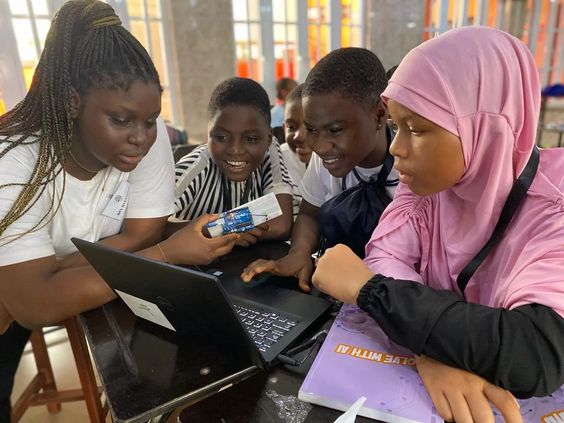Nigeria
W.TEC teaches artificial intelligence to girls in high schools

An artificial intelligence (AI) empowerment summer camp for 24 females selected from several secondary schools in Lagos has been completed by the non-governmental organisation (NGO), Women Technology Empowerment Centre (W.TEC).
The two-week long Summer Camp was hosted at Laureates College and Kiddies Kingdom Private School in Mafoluku, Oshodi, according to the News Agency of Nigeria (NAN).
According to the organisers, the “SheCreatesCamp” course with the focus on “Solve with AI” was required largely to encourage more women to embrace technology and its limitless possibilities.
On the sidelines of the occasion, W.TEC’s Chief Executive Officer, Mrs. Oreoluwa Lesi, told NAN that the organisation was looking for ways to encourage more women to pursue careers in STEM fields (Science, Technology, Engineering, and Math).
We focus on women and girls since, according to adverse statistics, they are underrepresented in STEM fields in general and in the technology sector in particular.
“The percentage of women studying and working in STEM fields is quite low. Women make up only 36% of students majoring in STEM fields worldwide, with the remaining students being men.
According to our data, only 22% of women work in engineering and technology in Nigeria.
Women only make up 20% of the workforce, she pointed out, “so we can see that women are already underrepresented in STEM fields.”
Lesi added that the goal of teaching the fundamentals of AI to schoolgirls was to pique their interest and support society’s efforts to close the gender gap and discrepancy in the STEM fields.
“We are focusing on these young females because we want to catch them when they are still deciding what career route they want to follow.
We chose the topic “Solve with AI” in order to introduce the subject to younger females and help them make educated career decisions.
We offer events like these workshops, seminars, and summer camps so that young people can consider their options and perhaps consider a career in technology or a STEM-related sector.
Because AI has places in all spheres of human effort, the camp also offers additional activities that will help the participants unwind and foster greater connections.
No matter what they may have studied, she continued, “AI is applied in them, which makes it more interesting and amazing.”
Lesi remarked that if women had greater understanding, they would recognise the enormous prospects presented by AI and embrace its research and uses.
There are enormous prospects in STEM because we can’t just leave it to the males. If our women can make substantial contributions to the development of AI, it will have a significant impact on the choices made when developing an app that both men and women will eventually use.
“The summer camp kids really outperformed my expectations because many of them became interested in STEM-related fields and were able to use AI to tackle hard problems.
“During the hard camping, they were able to construct an autonomous trash can that can open on its own using a human sensor rather than requiring our hands.
She added that among the incredible projects the girls worked on over the summer programme was the construction of an automatic water dispenser mechanism that can run just on human sensors.
The recipients, who were enthusiastic about the possibilities of AI, shared with NAN a variety of topics they had learned at the summer camp.
Ikenna Okoro, a senior secondary student at Trinity International College in Lagos, claimed that her time spent at camp was more valuable than what she paid for it.
She stated, “I have discovered new information about AI, and I would like to pursue a profession in any STEM field in the future.
Bushroh Yussuf from Tunwase High School added that she learned about software advancements and how to make apps with AI.
We were also taught web design, and after considering our own ideas for creating apps, we came up with our projects—an automated trash can and an automated water dispenser—she added.
Despite having notions about AI previously, Adaeze Nworah of the International School of Beam told NAN that the summer was difficult.
“This summer programme is incredibly intriguing and difficult to me because I previously heard about AI before the camp, and I have also gained interests.
We had to conduct a lot of test runs to ensure that we produced the greatest product, so I’m overjoyed that we can now finally get down and discuss how to construct an automatic water dispenser.
We had enough time to fix the mistakes and minimise any potential human interference with the water dispenser’s effective operation, the woman added.
Tamilore Paul-Taiwo, a student at Springforte Lead College, claimed that she would be more open to the idea of expanding career options in the tech sector if she had better knowledge about AI.
The summer camp, according to Royal Regent School student Esther Ajanigo, gave her the idea to pursue a career in software engineering.
“I want to join the ranks of women working in the tech industry, particularly in AI, and I want to raise awareness so that more girls can follow me on this journey.
She stated, “I would like to create an app that can run on smartphones and make life easier for us all.”
A summertime coach, Lesley Tarabina, claimed that the pupils had learned a lot that may improve their future. (NAN)
